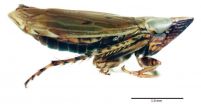(Press-News.org) Andrew Hicks from the Museum of Natural History at the University of Colorado and his team discovered a previously unknown leafhopper species in the New Jersey Pine Barrens, located just east of the megalopolis that extends from New York City to Washington, DC. This was the first time an insect has been reported from the state-listed threatened pinebarren smokegrass, Muhlenbergia torreyana. The study can be found in the open-access journal ZooKeys.
The discovery was made with the help of Dr. Gerry Moore of the Natural Resources Conservation Service in Greensboro, NC, and Uli Lorimer of the Brooklyn Botanic Garden.
Called F. whitcombi, the leafhopper was named after the author's "extraordinary" mentor, colleague and friend, Dr. Robert Whitcomb. "Among many other accomplishments," in the fields of microbiology and ornithology, Mr. Hicks points to Whitcombs' "major contributions" to leafhopper taxonomy and ecology.
Actually, it is exactly the ecology factor that could make it or break it for the "charismatic" new leafhopper. Not only is pinebarren smokegrass, which the insect inhabits, a threatened species, but it is known that the rest of the leafhoppers from the genus Flexamia, with a few exceptions, are each dependent on a very specific plant.
Although pinebarren smokegrass is still relatively well-distributed in the Pine Barrens, the Pine Barrens themselves have already been seen to suffer the effects of a warming climate. Various human activities could also pose a further threat to the leafhopper's host and the its habitat.
"The description of any new species may serve as a catalyst for additional research, and this will be best accomplished while the species still can be found in nature--something that can no longer be taken for granted," stressed the scientist. "To delay the publication of a species description until the time of a genus revision is to deny the pace of change in the natural world in the 21st century and may consign said new species to a future status of "known from a single collection", or, "presumed extinct, life history unknown," he added.
INFORMATION:
Original source:
Hicks A (2015) In the shadow of a megalopolis, a new Flexamia from a threatened grass species in the New
Jersey Pine Barrens (Hemiptera, Cicadellidae, Deltocephalinae, Paralimnini). ZooKeys 511: 69-79. doi: 10.3897/zookeys.511.9572
Young children, who possess a good understanding of their own emotions and of those of their fellow human beings early on, suffer fewer attention problems than their peers with a lower emotional understanding. Evidence of this phenomenon was found through a study of Leuphana University of Lueneburg and George Mason University, USA, under the auspices of Prof. Dr. Maria von Salisch, Professor of Developmental Psychology at Leuphana University of Lueneburg. The study was recently published in the journal Kindheit & Entwicklung (Childhood & Development).
The findings stem ...
Results of EORTC trial 62072 appearing in Cancer show that in patients with soft tissue sarcoma, whose disease had progressed during or after prior chemotherapy, pazopanib improved progression-free survival but did not change health-related quality of life. This observed improvement in progression-free survival without impairment of health-related quality of life was considered a meaningful result.
There has not been a lot of research that has looked into the quality of life of patients with advanced soft tissue sarcoma. The results of this EORTC health related quality ...
The risk of experiencing another stroke is higher if patients, after dilation of their blood vessels in the brain, receive not only clot-inhibiting drugs, but also have stents inserted. The recently published results of the VISSIT study confirm this conclusion of a rapid report by the German Institute for Quality and Efficiency in Health Care (IQWiG) of October 2014. Thus, the available studies still provide no evidence of a benefit of treatment with intracranial stents (also called "percutaneous transluminal angioplasty and stenting", PTAS). This is the conclusion of a ...
Biodegradable drinking cups or vegetable wrapping foil: the bioplastic known as polylactic acid (PLA) is already a part of our everyday lives. And yet, PLA is not yet considered a full alternative to traditional petroleum-based plastics, as it is costly to produce. Researchers from the KU Leuven Centre for Surface Chemistry and Catalysis now present a way to make the PLA production process more simple and waste-free. Their findings were published in Science.
The bioplastic PLA is derived from renewable resources, including the sugar in maize and sugarcane. Fermentation ...
A protein dubbed 'Bcl-Rambo' can protect against heart failure, suggests new research from King's College London and funded by the British Heart Foundation (BHF).
The Bcl-Rambo protein (also known as Bcl2-L-13) was named by a Japanese scientist because it was thought to be involved in activating cell death - 'Rambo' also means violence in Japanese. However, it seems that the Rambo movie character's protein counterpart has actually been misjudged. New research shows for the first time that the Bcl-Rambo protein may not be so violent after all and is actually involved in ...
Iron-nickel alloys are ubiquitous: they are found at the earth's core and in meteorites. What is fascinating about such alloys is that their inner structure can change with rapid temperature swings. Heated up above 730 °C (1,340 °F), these alloys enter what is referred to as an austenitic phase. Alternatively, they can be turned into very hard alloys, referred to as a martensitic phase, by subjecting them to extremely rapid cooling. Now a team of scientists from Germany has, for the first time, created a large-scale simulation involving 275,000 atoms representing ...
Researchers at the University of Adelaide have discovered a new method for culturing stem cells which sees the highly therapeutic cells grow faster and stronger.
The research, which was published in the prestigious international journal, Stem Cells, is expected to eventually lead to new treatments for transplant patients.
Kisha Sivanathan, a PhD student in the University of Adelaide's School of Medicine and the Renal Transplant Unit at the Royal Adelaide Hospital, says this is an exciting breakthrough in stem cell research.
"Adult mesenchymal stem cells, which ...
A study of 311 patients by The University of Manchester has found that it may be possible to predict early which rheumatoid arthritis (RA) patients will fail to respond to the biologic drugs given to treat them. These findings could help better manage patients' symptoms.
RA is a chronic disease which affects up to 1.5% of the population. It is a significant health burden for patients, who can experience pain, reduced mobility and premature death unless they receive effective treatment.
Biologics are a relatively new form of treatment for RA. Given by injection, ...
Pursuant to the Act on the Reform of the Market for Medicinal Products (AMNOG), the German Institute for Quality and Efficiency in Health Care (IQWiG) reassessed fingolimod (trade name: Gilenya), a drug for the treatment of adults with highly active relapsing remitting multiple sclerosis (RRMS). The Federal Joint Committee (G-BA) had limited its decision on the first assessment from 2012 to three years because it considered the certainty of the data as insufficient. This obliged the drug manufacturer to submit a second dossier.
It did not submit any new studies, but reanalysed ...
Scientists believe that a simple two-hour emotional awareness course aimed at making young offenders less aggressive could hold the key to significantly reducing the seriousness of their future crimes.
In the first ever study of its kind, psychologists from Cardiff University recorded a 44% drop in the severity of crimes committed by persistent reoffenders, six months following the completion of a course designed to improve their ability to recognise other people's emotions. The findings are published today in PLOS ONE journal.
Much has been published previously to ...

